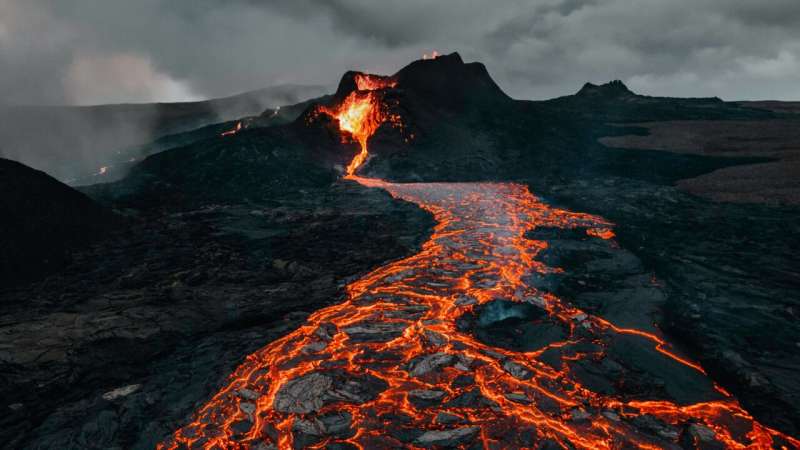This article has been reviewed according to Science X's editorial process and policies. Editors have highlighted the following attributes while ensuring the content's credibility:
fact-checked
trusted source
proofread
New research shows climate change will increase impacts of volcanic eruptions

Volcanic disasters have been studied since Pompeii was buried in 79 A.D., leading the public to believe that scientists already know why, where, when and how long volcanoes will erupt. But Jonathan Fink, volcanologist and director of the Digital City Testbed Center at Portland State University (PSU), said these fundamental questions remain a mystery.
Fink and Idowu "Jola" Ajibade, associate professor of Geography, recently published an article about how climate change will affect the societal impacts of eruptions. Their work is part of a novel 33-paper collection in the Bulletin of Volcanology, co-edited by Fink, which attempts to track how the entire field of volcanology has evolved over the last several decades.
"The public rarely thinks about how science changes—we learn odd facts from classes or news stories, but assume that the overall knowledge stays relatively constant. The reality is quite different," Fink said. "Volcano science advances steadily, in step with technological progress. But it also can change immediately and radically, in response to unusually large or impactful eruptions."
Consider Washington's Mount St. Helens' eruption in 1980, which taught the world about catastrophic volcanic landslides and blasts, or Campi Flegrei in Naples, Italy which threatens to erupt explosively any day. In 1980, geologists thought the Earth's crust behaved like a solid layer containing isolated pools of molten magma. Today we know it's more like a complex mush, making predicting when large volcanoes eruptions will occur considerably more difficult.
"Governments use past experience to forecast what might happen next. But because volcanoes can lie dormant for centuries, the policy toolbox may be relatively empty or outdated," Fink said. "This collection of papers, and the scientific symposia that they are based upon from 2000, 2010 and 2020, focus not only on the ingredients in the box of volcano knowledge, but also on how new ideas get added over a period of decades. From dozens of different perspectives, we've examined how the current knowledge about how volcanoes work has been assembled, which helps us anticipate how it will continue to change in the future."
Understanding how volcano activity may change over time is particularly important as climate change continues to have direct and indirect effects on how volcanoes behave.
"Sea level rise, glacial melting, aquifer depletion, and mountain erosion can all affect the likelihood and frequency of volcanic eruptions," he said. "With the increasing seriousness of climate impacts on society, the search for 'geoengineering' solutions will make it more likely that countries will consider volcano-mimicking interventions—like an injection of aerosols into the stratosphere to cool the Earth's surface. Volcano scientists will need to advise policymakers on the details of how such events would likely evolve."
The Pacific Northwest has the largest variety of potential natural and manmade disasters in North America, Fink adds, which have only increased in frequency and overlap in the last 20 years.
"This region is characterized by volcanic eruptions of different scales and types, catastrophic subduction zone earthquakes, mega-wildfires that can wipe out cities, wildfire smoke events that can make our air unbreathable, tsunamis that can drown coastal communities, landslides that can shut down transportation corridors, floods that can inundate cities, and heat dome events that can kill thousands of individuals," he said.
Fink's research with Ajibade shows that the likelihood of volcanic eruptions coinciding with climate-related storms, droughts, floods or other disasters is increasing, making planning and responding to crises more challenging.
"These kinds of 'cascading' or 'compound' disasters pose large challenges for public officials and for university faculty trying to train future volcano scientists," Fink said. "Rather than focusing exclusively on one aspect of volcanology, such as volcanic gases, volcanic earthquakes, or lava flows, future volcano scientists will need to know at least a little bit about a great many more fields, including social science, public health, and communication."
More information: Jonathan Fink et al, Future impacts of climate-induced compound disasters on volcano hazard assessment, Bulletin of Volcanology (2022). DOI: 10.1007/s00445-022-01542-y
Provided by Portland State University





















